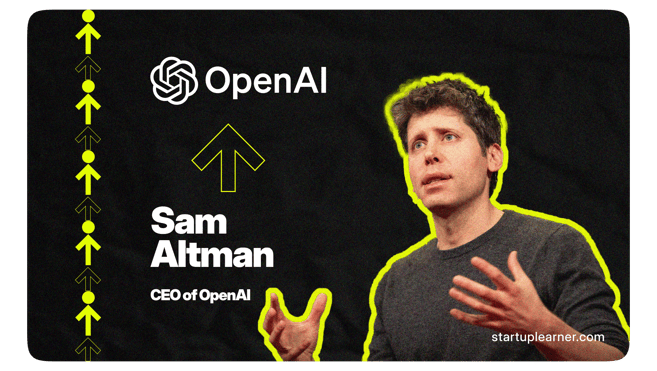Sam Altman: Architect of the AI Revolution and Startup Dream Machine
FOUNDERS
Startup Learner
4/28/20253 min read



Introduction
Sam Altman isn’t just a startup founder — he’s a startup institution.
From creating one of the earliest location-based apps to leading Y Combinator, backing hundreds of iconic startups, and now steering OpenAI, Sam’s fingerprints are all over the biggest technological shifts of the last 15 years.
His journey is a masterclass in ambition, patience, and thinking decades ahead.
Early Life and Background
Born in 1985 in Chicago and raised in St. Louis, Missouri, Sam was fascinated by computers early.
At 8 years old, he was programming and taking apart Mac computers to see how they worked.
He studied computer science at Stanford University but dropped out after two years — a move that would become iconic among startup founders later.
At just 19, Sam founded Loopt, a mobile app that allowed users to share their locations with friends — way ahead of its time.
Though Loopt wasn’t a runaway success (eventually sold for $43 million), it gave Sam a seat at Silicon Valley’s most elite tables.
The Big Idea: Turning from Founder to Startup Supercharger
After Loopt, Sam became part of Y Combinator — first as a founder, then as an advisor, and eventually becoming President of YC in 2014.
Under his leadership:
YC expanded internationally.
It launched YC Continuity to fund later-stage startups.
Alumni like Airbnb, Stripe, Reddit, and Dropbox became household names.
Sam wasn’t just handing out checks — he was deeply involved in advising, setting strategies, and redefining the startup playbook.
But he wasn’t done.
In 2015, Sam co-founded OpenAI along with Elon Musk and others, aiming to develop safe artificial intelligence that benefits humanity.
When Musk departed, Sam became CEO — and led OpenAI to release GPT models, ChatGPT, DALL-E, Codex, and more — triggering the current AI boom.
Building OpenAI: Balancing Power and Responsibility
Under Sam’s leadership, OpenAI transitioned from a non-profit research lab to a capped-profit company, allowing it to raise billions from investors like Microsoft without abandoning its ethical goals.
OpenAI’s mission:
Ensure that artificial general intelligence (AGI) benefits all of humanity.
Sam’s decisions included:
Making GPT-3 and ChatGPT publicly accessible.
Partnering with Microsoft for massive cloud infrastructure.
Advocating openly for AI regulation — balancing progress with caution.
In 2023, OpenAI’s products were used by hundreds of millions globally — redefining how we work, create, and think.
Sam’s public persona evolved too — from quiet startup guy to one of the most influential voices in AI ethics, future tech, and public policy.
Lessons for Founders
Sam Altman’s story delivers deep lessons for ambitious entrepreneurs:
1. Start young — but play long-term.
Sam wasn’t after quick wins — he built a decades-long strategy for impact.
2. Failure isn’t the end.
Loopt wasn’t a massive success, but it paved the way for bigger opportunities.
3. Build platforms, not just products.
YC was a platform for founders; OpenAI is becoming a platform for the future.
4. Move between roles when needed.
Founder, investor, CEO, policymaker — Sam wore many hats at different phases.
5. Think about humanity, not just revenue.
OpenAI’s charter reflects his belief in technology serving society, not just shareholders.
The Impact
Few individuals have had as broad an influence across startups and AI as Sam Altman.
YC democratized startup funding and inspired accelerators globally.
OpenAI changed the public imagination around what AI can do — from text generation to art to coding.
His advocacy for responsible AI is shaping government policies worldwide.
Sam has also invested personally in ambitious moonshots — from nuclear energy startups to biotech ventures aimed at extending human life.
Conclusion
Sam Altman’s story shows that building the future isn’t about any one company — it’s about creating an ecosystem of innovation.
For founders, his example teaches:
Think bigger than your current product. Think generations ahead. Build with purpose — and with patience.
In a world obsessed with overnight success, Sam Altman is building for the next 100 years.



